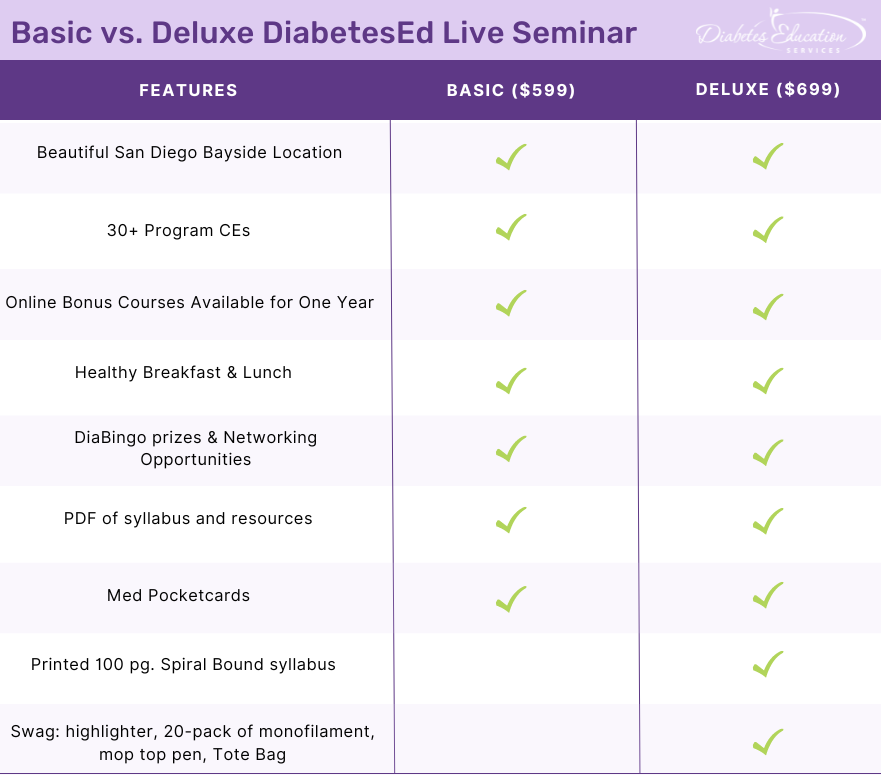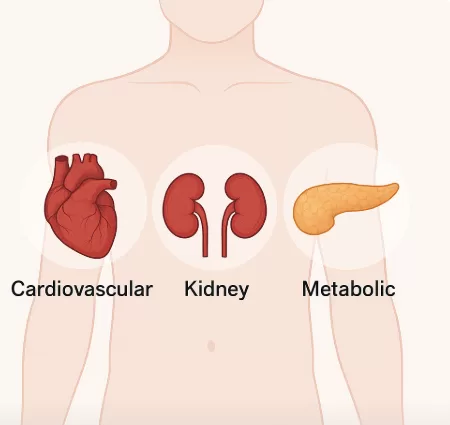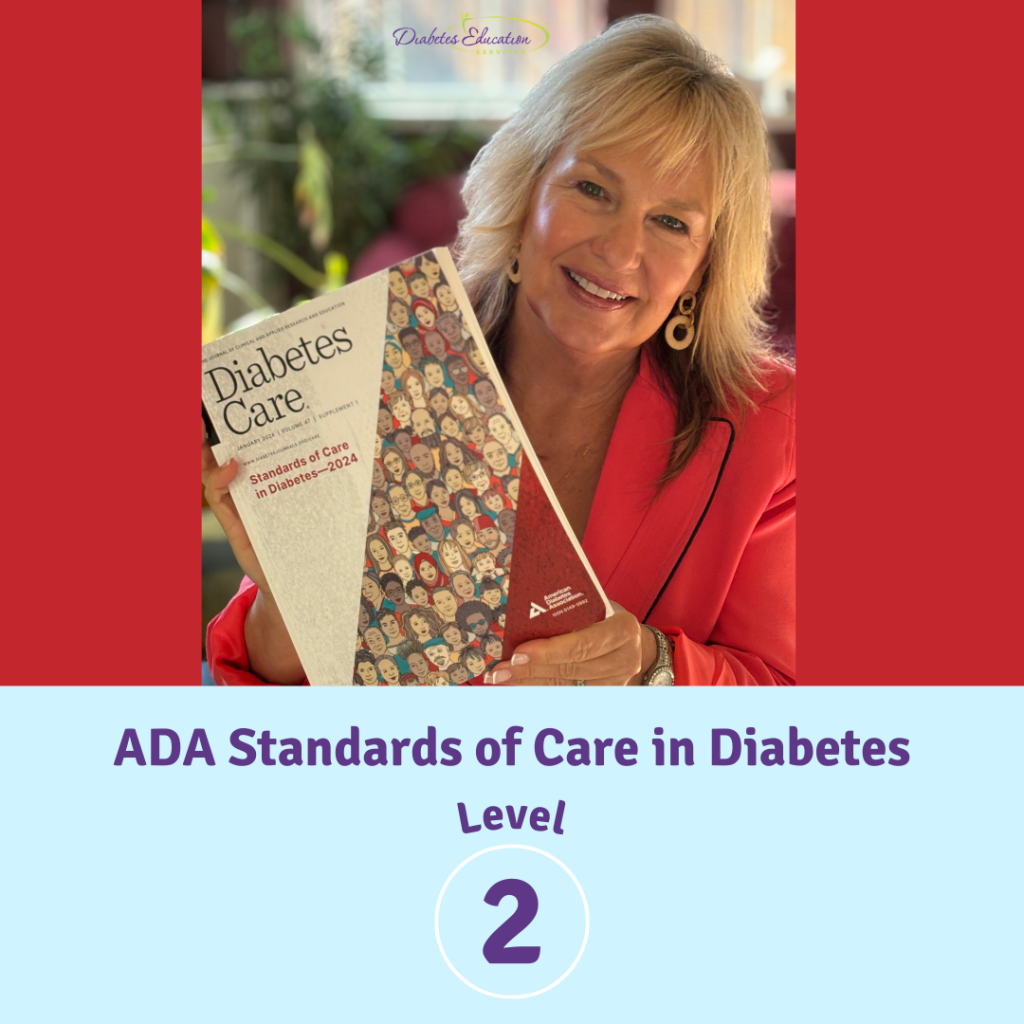Updates in Lifestyle Therapy for MASLD and MASH
Staging For Cardiovascular-Kidney-Metabolic (CKM) Syndrome
Winter Recipes that Nourish and Heal | by Dawn Desoto
Happy Registered Dietitian Nutritionist Day!
Welcome New Content Expert – Christine Craig, MS, RDN, CDCES

We are thrilled to welcome our newest member of the Diabetes Education Services faculty and blog team. Winner of the 2023 Impact on Diabetes Award, Christine Craig, MS, RD, CDCES is a leader in the field of nutrition, technology, and diabetes care. Her years of expertise combined with her person-centered approach and work ethic, make her a perfect fit for our company. In addition to writing a monthly blog and question of the week, Christine will also be providing nutrition lectures as part of Diabetes Fundamentals and Boot Camp. We are excited to integrate her fresh perspective and breadth of knowledge into our courses and blog offerings.
On a personal note, Christine loves to adventure. Travel, hiking, and snow skiing are her favorite pastimes. For Christine, having a moment to take in the landscape and beauty around us can re-energize and fuel a busy life.
Learn more about Christine’s approach to diabetes and nutrition education in this brief interview and you can read more about Christine here. Welcome, Christine!
Interview Christine Craig, MS, RDN, CDCES
What advances in nutrition therapy are you excited to explore?
Nutrition is a constantly evolving field that is both a science and an art; we know there is no one-size-fits-all approach. In the science of nutrition, I am excited by the emerging field of precision nutrition, which may give us better insight into an individual’s needs. Precision nutrition uses the complexity of genetics, metabolic profiles, individual microbiomes, wearables, lifestyle, and environmental exposures to better predict an individual’s nutrition needs. This science is still in the very early stages, but the ability to integrate precision nutrition with the art of nutrition has the potential to transform our approach to medical nutrition therapy.
How do you integrate social determinants of health when developing a diabetes management plan?
Developing a diabetes management plan involves finding out about the individual, asking questions, and not making assumptions that you know what is best for the person living with diabetes at that time. Life is complex and managing health can be complex. As a healthcare provider, we can’t always solve structural obstacles, which can feel overwhelming at times. We can, however, through shared decision-making, constant learning, and linking to community resources, develop a collaborative self-care plan that considers the individual’s social determinants of health.
What communication strategies do you find most effective when providing nutrition therapy?
As a dietitian and diabetes educator, I have worked across modalities of care including in-person visits, telehealth, chat-based message communication, and group classes. Like nutrition therapy, there is no one-size-fits-all approach; each person can respond differently to different style types. For me, what has always been effective is using non-judgmental language and open-ended questions. People want to feel heard; this opens the doors to trust and developing an effective nutrition plan.
What do you love most about being a diabetes nutrition specialist?
I love that diabetes care supports health throughout the lifespan, we care for individuals with diabetes over time and at different transition points in their lives. I love that we can walk into work each day and present a breadth of options to support the person living with diabetes or our care teams. I love that I can talk diabetes tech in one moment, nutrition meal planning in the next, and then end my day reviewing coping strategies. This profession is never boring and I love bringing the latest research into my daily practice.
Sign up for Diabetes Blog Bytes – we post one daily Blog Byte from Monday to Friday. And of course, Tuesday is our Question of the Week. It’s Informative and FREE! Sign up below!
Accreditation: Diabetes Education Services is an approved provider by the California Board of Registered Nursing, Provider 12640, and our CPEU courses have received Prior Approval* from the Commission of Dietetic Registration (CDR), Provider DI002. Since our CPEU courses received Prior approval* from the CDR, these CPEU courses satisfy the CE requirements for the CDCES /BC-ADM regardless of your profession!
The use of DES products does not guarantee the successful passage of the certification exam. CBDCE and ADCES do not endorse any preparatory or review materials for the CDCES or BC-ADM exams, except for those published by CBDCE & ADCES.
Can Understanding Chronotype Help with Glucose Regulation?
MR is frustrated that their morning glucose is almost always elevated. Since you have heard about the impact of “chronotype” on glucose, you ask them about eating patterns and explore whether they are early birds or night owls.
The 2024 American Diabetes Association (ADA) Standards of Care introduced the field of chrononutrition, the science of how our body’s 24-hour cycle (circadian rhythm), nutrition, and health interact. Growing evidence shows that factors, including when and type of food is eaten, hormones, genetics, exercise, sleep cycles, and a person’s daily light exposure, influence health and risk for metabolic disease.

A person’s chronotype is their body’s inclination to sleep at a particular time and rise at a certain time.
When we consider a person’s chronotype, we realize that it’s not just “what” individuals eat that impacts metabolic health. Could “when” they eat and their chronotype be just as crucial for glucose regulation? Can we leverage this information to suggest modifications in the type of nutrients consumed throughout the day to support improved glycemia?
Insights from Shift work
We have learned the association between circadian rhythm disruptions and metabolic disorders from people who perform shift work. Working in shift work and having type 2 diabetes is associated with increased A1c, neuropathy, and decreased psychological well-being.1 Glucose metabolism and tolerance follow a circadian rhythm throughout the day. Hormones, such as insulin and cortisol, cycle daily and regulate insulin sensitivity and glucose metabolism changes. Research suggests when food intake is out of sync with the daily cycle, this can reduce glucose tolerance and increase the risk of metabolic diseases such as type 2 diabetes, obesity, and cardiovascular disease.
“Meal timing and food nutrient components (chrononutrition) play an important role in regulating the circadian clock, enhancing metabolic health, and reducing the risk of type 2 diabetes.” 2
Time of Meal and Glucose Response
Post-prandial glucose response is affected by what and how much we eat and can vary based on the time of day the meal is consumed. Meal timing can affect type 2 diabetes, so it is important to consider timing in addition to composition alone. In a 2020 review article by Henry et al., they reported several different studies completed in individuals with type 2 diabetes and healthy subjects. These studies suggested both morning and late-night eating can contribute to the greatest glucose excursions. Eating after 8 pm was independently associated with an increase in A1C levels. Consuming more than a third of daily calories late in the evening led to higher post-meal glucose excursions and reduced morning glucose tolerance compared to other times of day. And a study of individuals with type 2 diabetes showed higher post-meal glucose trends after morning meals verses identical meals consumed throughout the day. These small studies suggest that modifying when a meal is consumed could reduce glycemia and the risk of diabetes. However, more extensive studies are needed to support causation and associate it with a person’s genetics and true chronotype.
Macronutrient meal composition
Macronutrient meal composition and the time of day consumed may also play a role in chrononutrition. Whether it is a variation of calories consumed or manipulating different macronutrients from meal to meal, the relationship between food type and timing could affect glucose metabolism. Changes in insulin sensitivity throughout the day can affect post-meal glucose in response to varying carbohydrate quantity, quality, and rate of digestion. Davis et. Al, 2019 found that increased protein and lower carbohydrates at dinner meals reduce night post-prandial glucose compared to standard meals.
The key nutrition recommendations from the 2024 ADA Standards of Care are focused on individualizing eating patterns, meal plans, and dietary approaches. Research continues to evolve in this field, and there is much more to understand and validate. Most of the articles regarding chrononutrition referenced in the ADA Standards of Care are specific for type 2 diabetes, but we know circadian cycles and metabolism also play a role in type 1 diabetes. More research is needed to improve our understanding of why nutrients consumed at different times of day have differing effects, how this relates to the individual’s circadian biomarkers and genetics, and how it interplays with psychological factors that drive sleep cycles.
Take home messages
There is much to learn, but are there practical approaches we could consider implementing now? Yes! We can start by:
- Individualizing our recommendations, reviewing meal timing and composition with individuals with diabetes.
- Encourage clients to experiment with modifying macronutrient distribution at different times of the day instead of using a “each meal looking the same” approach.
- Continue to stay abreast of new evidence that highlights research findings in this area.
Blog contributed by nutrition expert Christine Craig, MS, RDN, CDCES
References:
- American Diabetes Association Professional Practice Committee; 5. Facilitating Positive Health Behaviors and Well-being to Improve Health Outcomes: Standards of Care in Diabetes—2024. Diabetes Care 1 January 2024; 47 (Supplement_1): S77–S110. https://doi.org/10.2337/dc24-S005
- Henry, C.J., Kaur, B. & Quek, R.Y.C. Chrononutrition in the management of diabetes. Nutr. Diabetes 10, 6 (2020). https://doi.org/10.1038/s41387-020-0109-6
- Chrononutrition: Timing of meals matters for your health. Downloaded on January 13th, 2024 from https://www.nhlbi.nih.gov/news/2023/chrononutrition-timing-meals-matters-your-health.
- Davis R, Bonham M, Nugo K, Huggins C. Glycaemic response at night is improved after eating a high protein meal compared with a standard meal: A cross-over study. Clinical Nutrition. 35, 5 (2019) https://doi.org/10.1016/j.clnu.2019.06.014
Want to learn more about the latest in MNT and Diabetes Care?
Join us for our upcoming 2024 Boot Camp Series
Airs live February 13th – March 19th, 2024, at 11:30 am PT

Class Topics & Webinar Dates:
- February 13, 2024 – Boot Camp 1: Diabetes | Not Just Hyperglycemia | 1.75 CEs
- February 15, 2024 – Boot Camp 2: Standards of Care & Cardiovascular Goals | 1.8 CEs
- February 20, 2024 – Boot Camp 3: Meds for Type 2 | What you need to know | 1.75 CEs
- February 22, 2024 – Boot Camp 4: Insulin Therapy | Basal/Bolus to Pattern Management | 1.75 CEs
- February 27, 2024 – Boot Camp 5: Insulin Intensive & Risk Reduction | 1.75 CEs
- February 29, 2024 – Boot Camp 6: Medical Nutrition Therapy | 1.75 CEs
- March 12, 2024 – Boot Camp 7: Microvascular Complications & Exercise | 1.75 CEs
- March 14, 2024 – Boot Camp 8: Coping & Behavior Change | 1.75 CEs
- March 19, 2024 – Boot Camp 9: Test-Taking Coach Session (48 Questions) | No CE
Intended Audience: This library of critical information is designed for individuals or groups of diabetes specialists, including RNs, RDs, Pharmacists, Nurse Practitioners, Clinical Nurse Specialists, Physician Assistants, and other health care providers interested in staying up to date on current practices of care for people with diabetes and preparing for the BC-ADM or the CDCES certification Exam.
Can’t make it live? No worries. We will send post the recorded version to the Online University within 24 hours of the broadcast
Instructor: Beverly Thomassian RN, MPH, CDCES, has been Board Certified in Advanced Diabetes Management for over 20 years. She is an Associate Clinical Professor at UCSF, a working educator, and a nationally recognized diabetes expert. She has a Master’s Degree in Public Health from UCLA, with a focus on behavioral health and education.
Accreditation: Diabetes Education Services is an approved provider by the California Board of Registered Nursing, Provider 12640, and our CPEU courses have received Prior Approval* from the Commission of Dietetic Registration (CDR), Provider DI002. Since our CPEU courses received Prior approval* from the CDR, these CPEU courses satisfy the CE requirements for the CDCES /BC-ADM regardless of your profession!
The use of DES products does not guarantee the successful passage of the certification exam. CBDCE and ADCES do not endorse any preparatory or review materials for the CDCES or BC-ADM exams, except for those published by CBDCE & ADCES.
Sign up for Diabetes Blog Bytes – we post one daily Blog Byte from Monday to Friday. And of course, Tuesday is our Question of the Week. It’s Informative and FREE! Sign up below!
How Much insulin to Cover for Allulose? The Answer might Surprise you.
JR lives with type 1 diabetes and is excited to eat a stack of blueberry pancakes with a new type of maple syrup sweetened with allulose. The syrup label reads that there are 28 grams of carbs in 2 Tablespoons of Zero Sugar Maple syrup. JR adds up the total carbs in the pancakes and syrup, and takes 6 units of bolus insulin (4 for the pancakes and 2 units for the syrup). Within a half hour, JR realizes their blood sugar is dropping fast and grabs some glucose tabs to treat the sudden low. Trying to figure out what went wrong, JR double confirms the nutrition in the pancakes and then takes a closer look at the Maple Syrup label.
Is the Maple Syrup to blame for the Unexpected Low Blood Sugar?
Looking at the label, JR confirms that there are 28 gm of carbs per serving of this unique maple syrup and 26 of those carb grams come from Allulose. Allulose is a low-calorie sugar that is Generally Recognized As Safe (GRAS) approved by the FDA in 2022. Allulose is considered a rare sugar found naturally in figs, raisins, wheat, maple syrup, and molasses or it can be commercially produced and added to foods. It’s roughly 70% as sweet as sugar and it tastes very similar. Allulose is hardly digested or absorbed, so it provides very few calories – approximately 0.4 calories per gram, compared with 4 calories per gram in table sugar.
Because very little of ingested allulose is absorbed, the impact on post-meal glucose levels is negligible.

Allulose labeling Can Cause Confusion for People Matching Insulin to Carbs
In 2019, US Food and Drug Administration (FDA) issued guidance, allowing food manufacturers to exclude allulose from total and added sugar counts on Nutrition and Supplement Facts labels. Like sugar alcohols and dietary fiber, allulose still counts towards total carbohydrates on the nutrition label.
The fact that allulose hardly raises blood sugar may lead people who match insulin to carbs to take more insulin than needed.
FDA Labeling Rule for allulose:
• Not included in “Total Sugars” or ”Added Sugars”
• Included in Total Carbohydrates
• Calories calculated with 0.4 kcals/gram
• Must be in the ingredient list
Take home message for People Counting Carbs for Accurate Insulin Dosing
Look on labels to see if allulose is listed under carbohydrates or included in the ingredient list. If it is, subtract allulose carbs from the total carbs to get an accurate carbohydrate measurement.
For other people, allulose may be a sweet-tasting alternative to sugar that provides few calories and doesn’t raise blood sugar.
Fruit and Vegetable Prescriptions Improve Health

In a recent study published in Circulation, large, multisite produce prescription programs were associated with significant improvements in fruit and vegetable intake, food security, and health status for adults and children. At the conclusion of the food prescription program, participants experienced clinically relevant improvements in A1C, blood pressure, and body weight.
However, for this food-is-medicine strategy to work, it’s clear that the people will need long-term support.
The idea of food as medicine dates back to the ancient Greek doctor Hippocrates, and this new study adds to the evidence that a diet full of fruits and vegetables can help improve heart health.
Researchers evaluated the impact of “produce prescriptions,” which provide free fruits and vegetables to people with diet-related diseases including diabetes, obesity, and hypertension. The study included nearly 4,000 people in 12 states who struggle to afford healthy food. They received vouchers, averaging $63 a month, for up to 10 months, which could be redeemed for produce at retail stores or farmers markets, depending on the location.
Many people with diabetes struggle not only with food insecurity but also with nutrition insecurity. Improving nutrition security is about providing the right food to prevent or decrease the prevalence of chronic conditions like diabetes, heart disease and hypertension.
By providing adults with hypertension with access to healthy fruits and vegetables using a prescription program, this study demonstrated a systolic blood pressure decrease of 8 mm Hg and diastolic blood pressure decrease of about 5 mm Hg. In addition, among people with diabetes, A1C levels also declined significantly, by about 0.6 percent.
“Anything that lowers hemoglobin A1C and improves blood pressure control is beneficial,” says Dr. Dariush Mozaffarian, a cardiologist and professor at the Friedman School of Nutrition at Tufts University, where the research was conducted. The challenge is to maintain these reductions.
The research clearly indicates that food prescription programs are an effective strategy to improve health outcomes, but long-term funding for these programs is difficult to secure.
More research is needed to establish which individuals and communities will most benefit from which food assistance programs. Options include medically tailored meals, produce prescriptions, and community-based programs. The ultimate goal is to get to a place where these programs cover long-term benefits for people who need them most.
Resources and Related Articles
Wholesome Wave – partnering with community organizations to provide the right food to people at risk.
White House Conference on Hunger, Nutrition and Health
7 Ideas to Eat Healthier in the U.S.
Want to learn more about how nutrition can support people living with diabetes?
Join us LIVE in San Diego for our DiabetesEd Training Conference with Ashley LaBrier MS, RD, CDCES as she reviews MNT & Meal Planning

Two Registration Options

Join Coach Beverly and Team for two and a half days of knowledge-sharing, fun, networking, games with prizes, and “aha” moments in beautiful San Diego.
You don’t want to miss this one-of-a-kind learning opportunity. Get away from all those daily responsibilities and immerse yourself in a fun and intensive conference with plenty of networking opportunities.
Attendees will leave this conference with new tools and a more complete understanding of the latest advances in diabetes care, from medications to technology to Medical Nutrition Therapy!
Bring your colleagues and enjoy our friend discount.
Our team expertly translates the complex science of diabetes into understandable terms while keeping it real, practical, and fun.
Team of expert faculty includes:
- Diana Isaacs, PharmD, BCPS, BC-ADM, BCACP, CDCES – Educator of the Year, 2020
- Coach Beverly Thomassian, RN, MPH, CDCES, BC-ADM
- Ashley LaBrier, MS, RD, CDCES, Diabetes Program Coordinator
All hours earned count toward your CDCES Accreditation Information
Sign up for Diabetes Blog Bytes – we post one daily Blog Byte from Monday to Friday. And of course, Tuesday is our Question of the Week. It’s Informative and FREE! Sign up below!
The use of DES products does not guarantee the successful passage of the CDCES exam. CBDCE does not endorse any preparatory or review materials for the CDCES exam, except for those published by CBDCE.










 Coach Beverly Thomassian RN, MPH, CDCES, BC-ADM – CEO of DiabetesEd Services
Coach Beverly Thomassian RN, MPH, CDCES, BC-ADM – CEO of DiabetesEd Services Diana Isaacs, PharmD, BCPS, BCACP, CDCES, BC-ADM, FADCES, FCCPCES
Diana Isaacs, PharmD, BCPS, BCACP, CDCES, BC-ADM, FADCES, FCCPCES  In support of improving patient care, this activity has been planned and implemented by Partners for Advancing Clinical Education (Partners) and Diabetes Education Services. Partners is jointly accredited by the Accreditation Council for Continuing Medical Education (ACCME), the Accreditation Council for Pharmacy Education (ACPE), and the American Nurses Credentialing Center (ANCC), to provide continuing education for the healthcare team.
In support of improving patient care, this activity has been planned and implemented by Partners for Advancing Clinical Education (Partners) and Diabetes Education Services. Partners is jointly accredited by the Accreditation Council for Continuing Medical Education (ACCME), the Accreditation Council for Pharmacy Education (ACPE), and the American Nurses Credentialing Center (ANCC), to provide continuing education for the healthcare team.









 These treasured food and nutrition experts translate the science of nutrition into practical solutions for healthier living.
These treasured food and nutrition experts translate the science of nutrition into practical solutions for healthier living.






